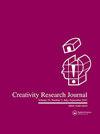群体音乐创意干预成人认知功能差异的可行性与可接受性
IF 2.5
3区 心理学
Q2 PSYCHOLOGY, EDUCATIONAL
引用次数: 0
摘要
摘要维持认知完整和认知受损成人的健康认知功能和延缓认知衰退是解决痴呆疾病负担的主要研究举措。音乐干预是有希望的,非药物治疗的选择,以保持认知功能和心理健康的老年人有不同程度的认知功能。虽然被动的音乐干预在异常认知衰老的文献中引起了相当大的关注,但主动的音乐干预,如音乐创造力,研究得较少。在58名具有不同认知功能水平(认知健康到轻度认知障碍)的老年人中,我们检验了CHROMA项目的可行性和可接受性,这是一项旨在评估一种新颖的音乐创造力课程对各种健康结果的影响的1期临床试验。音乐干预的参与率(93%)、总体研究保留率(78%)和干预满意度(100%)与其他类似设计的临床试验相当。使用混合水平模型的探索性分析测试了干预对认知和心理结果的有效性。与对照组相比,音乐组的参与者在认知功能和社会情感健康方面表现出一些改善。研究结果表明,一项为期6周的音乐创造力临床试验可以在不同认知能力的样本中实施几种多模式健康评估。作者要感谢研究协调员Kristi English、Yoully Kang、Vincent Lai和Russell Ku,感谢他们在不断变化的公共卫生环境中管理这个项目。披露声明作者未报告潜在的利益冲突。本研究由国家艺术基金会(1855491-38- c - 19,1892183 -38-21)和休斯顿卫理医院表演艺术中心资助。作者也由美国国家老龄研究所资助(Fagundes: 1R01AG062690, 1R01AG062690- 02s1, 1R21AG061597-01A1;Wu-Chung: 1F31AG074648)和国家医学图书馆(Bonomo: T15LM007093)。本文章由计算机程序翻译,如有差异,请以英文原文为准。
Feasibility and Acceptability of a Group Music Creativity Intervention for Adults with Varying Cognitive Function
ABSTRACTMaintaining healthy cognitive functioning and delaying cognitive decline in cognitively intact and cognitively impaired adults are major research initiatives for addressing dementia disease burden. Music interventions are promising, non-pharmaceutical treatment options for preserving cognitive function and psychological health in older adults with varying levels of cognitive function. While passive, music interventions have attracted considerable attention in the abnormal cognitive aging literature, active, music interventions such as music creativity are less well-studied. Among 58 older adults with different levels of cognitive function (cognitively healthy to mild cognitive impairment), we examined the feasibility and acceptability of Project CHROMA, a Stage 1 clinical trial developed to assess the effects of a novel, music creativity curriculum on various health outcomes. Music intervention participation (93%), overall study retention (78%), and intervention satisfaction (100%) rates were comparable to other similarly designed clinical trials. Exploratory analyses using mixed-level modeling tested the efficacy of the intervention on cognitive and psychological outcomes. Compared to those in the control condition, participants in the music condition showed some improvements in cognitive functioning and socioemotional well-being. Findings suggest that a 6-week music creativity clinical trial with several multi-modal health assessments can be feasibly implemented within a sample of varying cognitive ability.KEYWORDS: creativitymusicmild cognitive impairmentcognitionclinical trialquality of life AcknowledgmentsThe authors want to thank study coordinators - Kristi English, Yoully Kang, Vincent Lai, and Russell Ku - for their diligence in managing the project amidst changing public health circumstances.Disclosure statementNo potential conflict of interest was reported by the authors.Supplementary materialSupplemental data for this article can be accessed online at https://doi.org/10.1080/10400419.2023.2272105Additional informationFundingThis work was funded by the National Endowment for the Arts (1855491-38-C-19, 1892183-38-21) and the Center for Performing Arts Houston Methodist Hospital. Authors are also funded by the National Institute on Aging (Fagundes: 1R01AG062690, 1R01AG062690-02S1, 1R21AG061597-01A1; Wu-Chung: 1F31AG074648) and National Library of Medicine (Bonomo: T15LM007093).
求助全文
通过发布文献求助,成功后即可免费获取论文全文。
去求助
来源期刊

Creativity Research Journal
Multiple-
CiteScore
5.10
自引率
7.70%
发文量
52
期刊介绍:
Creativity Research Journal publishes high-quality, scholarly research capturing the full range of approaches to the study of creativity--behavioral, clinical, cognitive, crosscultural, developmental, educational, genetic, organizational, psychoanalytic, psychometrics, and social. Interdisciplinary research is also published, as is research within specific domains (e.g., art, science) and research on critical issues (e.g., aesthetics, genius, imagery, imagination, incubation, insight, intuition, metaphor, play, problem finding and solving). Integrative literature reviews and theoretical pieces that appreciate empirical work are extremely welcome, but purely speculative articles are not published. Readers are encouraged to send commentaries, comments, and evaluative book reviews.
 求助内容:
求助内容: 应助结果提醒方式:
应助结果提醒方式:


